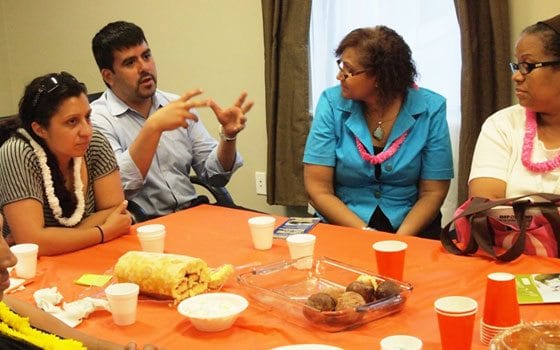
Once a month, seven groups of families meet in the Jamaica Plain office of the Family Independence Initiative (FII) to discuss their progress toward their goals — starting businesses, learning English, buying a home, fixing bad credit, helping their children get better grades.
As the families talk and share strategies, a staff member from the FII takes notes and records data on the families’ progress — changes in income and savings, improvements in children’s school attendance.
The staff of the experimental anti-poverty program offers neither assistance nor suggestions. They just take notes. And it seems to be working. In the first six months of the program, the 35 families enrolled have seen their income increase by 14 percent, according to FII Boston Executive Director Jesus Gerena, and personal savings have increased by 22 percent.
It’s a decidedly atypical anti-poverty approach, Gerena points out.
“We’re trying something new,” he says. “Instead of professional interventions, we’re saying, ‘let’s invest in communities and put money in the pockets of families and let them figure it out.’ ”
The monetary investment the Oakland, Calif.-based nonprofit makes in participating families is modest. One representative of each of the 35 participating families is paid as much as $600 a month to record progress family members have made in meeting their goals. The core principle that makes the project effective is the sharing of strategies and resources, a strategy that Gerena says has been an effective anti-poverty tool for much of American history.
Gerena points to his own mother, who moved to Amherst from Puerto Rico when he was 10.
“There were eight of us in a two bedroom apartment in Amherst,” he recalls. “As soon as we moved in, the little Puerto Rican community in Amherst came to our door. ‘What do you need — you want to go back to school? Talk to this person. You need housing, there’s a lady in my church who will help you.’
“Little by little, these things opened up for us,” Gerena continues. “Within 10 years, my mom got a B.A., a masters degree, bought a house and got two out of three of her kids into college. And she got a job at UMass Amherst.”
For many low-income families, anti-poverty programs have stepped in and taken the place of self-organizing communities, attacking the causes of poverty with an array of programs. But, Gerena points out, the rates of poverty in the United States haven’t changed substantially since President Lyndon Johnson launched the War on Poverty in 1964.
The Family Independence Initiative was launched in 2001 as an alternative to traditional anti-poverty programs. After completing demonstration projects in Oakland, Hawaii and San Francisco, the project opened an office in Boston headed by Gerena.
The Boston project serves 152 individuals in 35 families. Individuals are invited into the project, then asked to bring in more family members and acquaintances.
“They create networks for support,” says Wandy Peguero, a family liaison who works part-time taking notes during meetings of the groups. “The main idea is for them to lead everything by themselves, that they themselves know what’s best for them.”
Since joining FII, Isabel Flores has enrolled in Springfield College, gotten a second job and begun fixing her credit. And she shares information on where to get help with the other families in her group.
“Anything I get that’s helpful — elder care, youth activities — I blast it out over e-mail,” she says. “A lot of services are out there, but people don’t know about them.”
Participants who gathered at FII’s Jamaica Plain office described multi-layered approaches to self-improvement. Some approaches, like education, starting a small business or buying a home, focus on acquiring skills and building assets.
Others, like enrolling children in afterschool programs or securing food stamps, are more a matter of taking advantage of existing anti-poverty measures.
In the end, FII hopes to use the data to better understand what strategies work for low-income families.
“We’re getting information now so hopefully we can inform policies to better help people and figure out what really works,” Gerena says.







